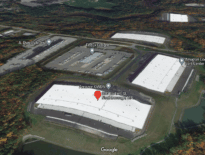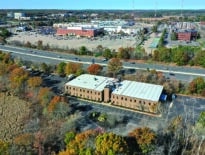Mayoral candidates Michelle Wu and Annissa Essaibi George offer fairly similar visions for Boston’s future on the key issues of housing and new development, with very different ways of realizing those visions.
After long conversations with both candidates, it’s clear to this editorial board that there would be a lot of similarities between real estate development in Michelle Wu’s Boston and Annissa Essaibi George’s. Both are quite liberal and both are strongly committed to building more housing citywide. And both put equity issues at the hearts of their respective campaigns.
On the surface, Essaibi George would seem to be the better candidate to keep Boston’s building boom rolling and getting built the housing that the city so desperately needs.
She presents several compelling ideas for how to renovate the current system, and she speaks with expert familiarity on how the city must streamline its permitting processes and create online tools to help developers trim delays and other soft costs. She is excited by the possibilities of accessory dwelling units – as yet barely allowed in Boston – to add density where it didn’t exist before.
Read the editorial board’s interview with Michelle Wu
Read the editorial board’s interview with Annissa Essaibi George
Essaibi George makes a plausible case as the pro-growth, pro-development candidate, but her stance on rental housing muddies the waters. She argues there has been too much emphasis on the construction of new rental housing, and would like to see a shift towards more projects offering the possibility of ownership. As the city needs every new unit it can get – including apartments, as the boom in luxury units has failed to trickle affordability down to the rest of the market – this is the wrong approach, especially with prices likely to stay out of reach for many middle-class buyers.
When it comes to real estate issues, the biggest split is one of ambition. At the end of the day, Essaibi George’s development plan for Boston would still be a parcel-by-parcel world. Wu, on the other hand, would prefer to largely wipe away the current zoning maps and start fresh. She would probably be able to do it, too, with the tools already in the mayor’s control – as opposed to rent stabilization and “abolishing” the Boston Planning & Development Agency, which, barring a major realignment on Beacon Hill, are unlikely to ever become reality.
The decades of planning studies that fill filing cabinets on the ninth floor of City Hall have largely stayed gentle guidelines, not codified into zoning. A Wu administration would ostensibly change that by launching a citywide planning process and turning that into new zoning rules through the city’s existing Zoning Commission. And she has the steel, political skill and – judging by two recent polls – is on track to enter office with the political capital needed to get it done.
This proposal to rezone the entire city strikes all the right notes about community involvement, yet suburban communities have long used zoning to block not just apartment projects, but also all but the most expensive single-family homes. A citywide rezoning could simply result in NIMBY neighborhood groups redrafting the rules to bar all development they dislike, with rental housing likely to be at the top of the list.
Wu spoke convincingly in her interview with this editorial board about how her hypothetical administration would see certain priorities as non-negotiable, like density near transportation, and the need to both keep up housing production and deploy city funds to ensure housing is built at price points affordable by working- and middle-class Bostonians. These baseline principles could deliver a development landscape that enables more growth, more opportunity, lower soft costs and more definite development timelines – provided Wu pushes hard to make sure a newly rezoned city has substantial room to keep growing in every neighborhood.
It’s reasonable to take a step back and ask whether the city really needs to revamp its entire current development system. It’s not like it keeps a firm lid on development. Thanks to market pressures and former Mayor Marty Walsh’s decision to make housing construction a priority, in the past few years the city has seen more new buildings and more new housing go up from East Boston to West Roxbury than it has in generations.
But the system still imposes a serious cost burden on new projects, forcing developers to hold onto underproductive or unproductive property while playing a game of Chutes and Ladders trying to get their proposals approved. It also throws up barriers to entry for those who don’t know how to play the game. And it can in the end crash a project based on the whim of a small group that gets the ear of someone powerful. This year alone, Zoning Board of Appeal chair Christine Araujo has vetoed several reasonable multifamily developments for seemingly small reasons, like a lack of parking for a BPDA-approved, 23-unit Dorchester building that would house families trying to escape homelessness, most of whom don’t have cars.
Essaibi George’s answer to this problem is a well-informed one but, we fear, insufficient. With so much demand for housing, lab and industrial space in every part of the city, Boston needs to craft a new consensus about where development can go, and needs a permitting process that’s more open to newcomers. Simply making the current machine’s cogs spin faster, as Essaibi George would seek to do, won’t be enough to achieve that.
Real estate leaders have repeatedly said that the best thing Boston can do to reduce development costs would be to codify a zoning process that allows for more growth and removes the need for months of community consultations. That is precisely what Wu hopes to do.
Looking back on the last decade of Boston’s growth, it’s clear the city has outgrown its old modes of shaping the built environment. And despite being better known for big-picture visions that she would not have the ability to immediately realize solely as mayor of Boston, Wu has solid plans that can start building a new Boston right away with the powers City Hall already has. Boston needs to be shaken up, and Wu appears to be the better – albeit not perfect – person to do it.
Letters to the editor of 350 words or less may be submitted via email at editorial@thewarrengroup.com with the subject line “Letter to the Editor,” or mailed to the offices of The Warren Group. Submission is not a guarantee of publication.






